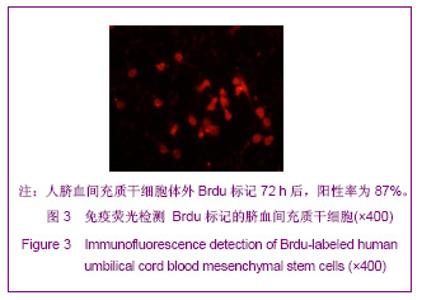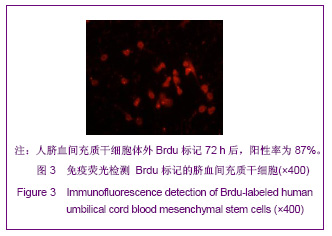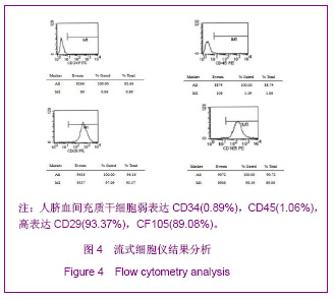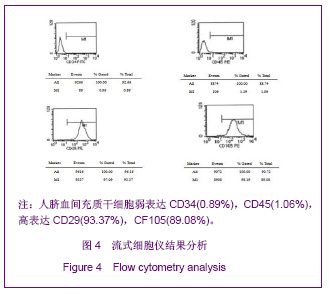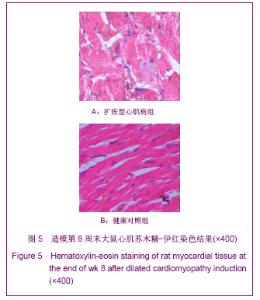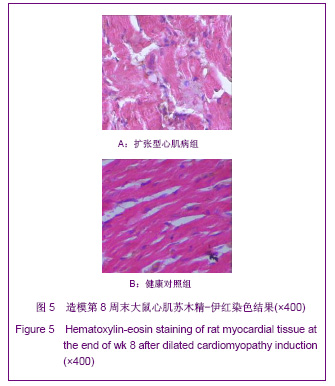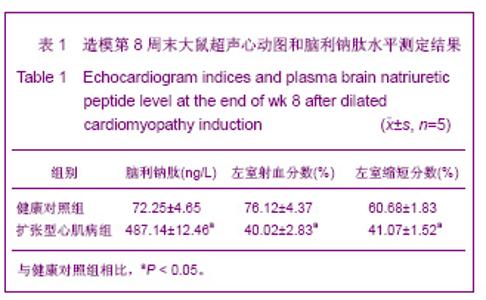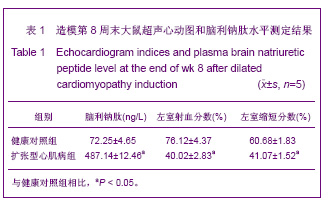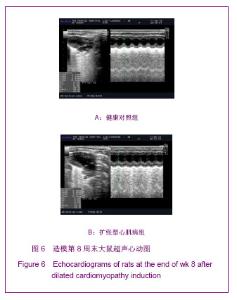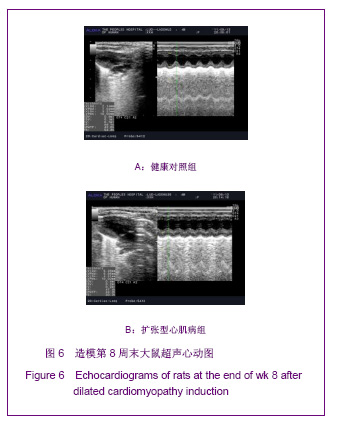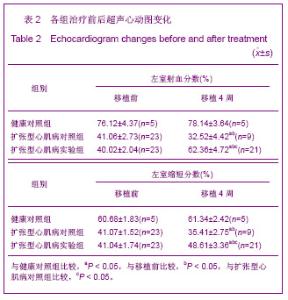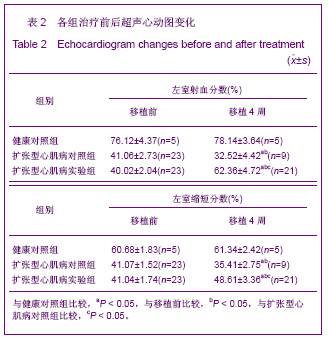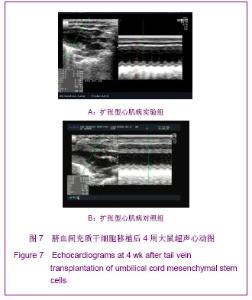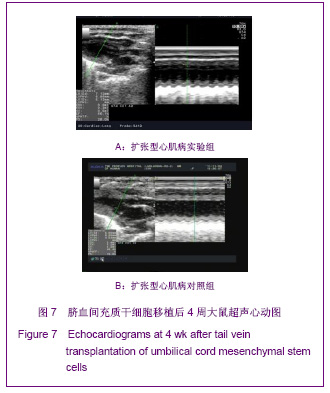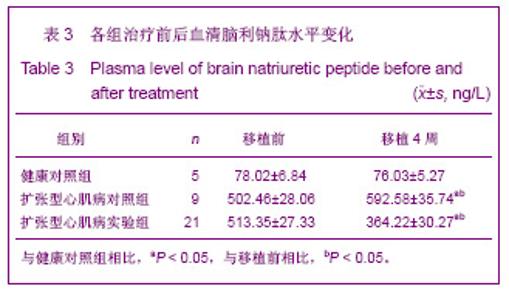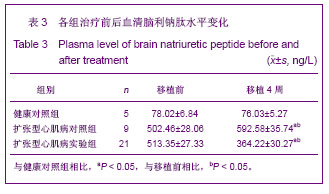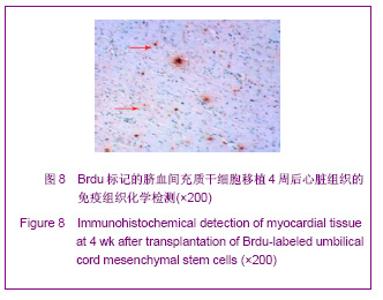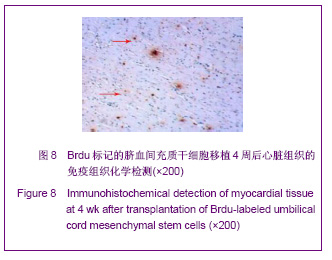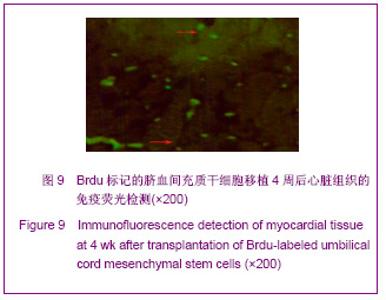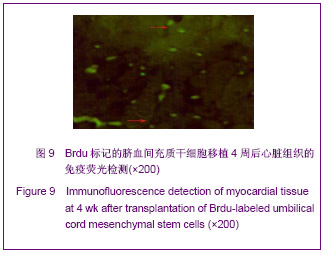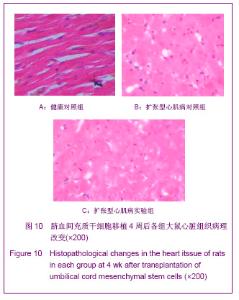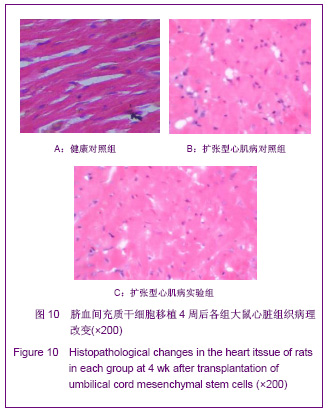Chinese Journal of Tissue Engineering Research ›› 2013, Vol. 17 ›› Issue (6): 1029-1036.doi: 10.3969/j.issn.2095-4344.2013.06.014
Previous Articles Next Articles
Tail vein transplantation of human umbilical cord blood mesenchymal stem cells for treatment of dilated cardiomyopathy
Luo Jian-hong, He Xue-hua, Liao Jin-mao, Yuan Yong-hua, Hu Sha-ya
- First Affiliated Hospital of Hunan Normal University, Changsha 410000, Hunan Province, China
-
Received:2012-04-12Revised:2012-05-24Online:2013-02-05Published:2013-02-05 -
Contact:He Xue-hua, Master, Associate chief physician, First Affiliated Hospital of Hunan Normal University, Changsha 410000, Hunan Province, China -
About author:Luo Jian-hong★, Master, Physician, First Affiliated Hospital of Hunan Normal University, Changsha 410000, Hunan Province, China jhluo@126.com
CLC Number:
Cite this article
Luo Jian-hong, He Xue-hua, Liao Jin-mao, Yuan Yong-hua, Hu Sha-ya. Tail vein transplantation of human umbilical cord blood mesenchymal stem cells for treatment of dilated cardiomyopathy[J]. Chinese Journal of Tissue Engineering Research, 2013, 17(6): 1029-1036.
share this article
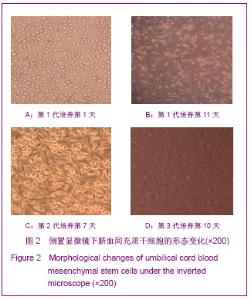
2.1 大鼠的一般情况 健康对照组大鼠进食、活动均正常,体质量稳定增长;扩张型心肌病对照组大鼠纳差,活动明显下降,体质量出现负增长或增长缓慢,出现蜷卧、脱毛、腹部膨隆等症状和体征。由于阿霉素的急、慢性毒性作用,实验第8周末扩张型心肌病组(扩张型心肌病实验组19只,扩张型心肌病对照组20只)大鼠死亡率为43%,健康对照组未见大鼠死亡。细胞移植4周后,健康对照组(n=5):大鼠的一般状态良好,体质量逐渐增长,未出现死亡。扩张型心肌病对照组(n=23):大鼠懒动、脱毛、反应差、蜷缩、少食及腹泻等症状,体质量逐渐下降,部分大鼠出现腹水,随着时间的延长,死亡大鼠逐渐增多,共死亡14只。扩张型心肌病实验组(n=23):人脐血间充质干细胞移植后进食较前增加,精神状态逐渐好转,体质量有增长,但低于健康对照组,死亡2只。 2.2 人脐血间充质干细胞培养过程中的形态观察 所取脐血经密度梯度离心后,可见分离液和血浆之间的单个核细胞白膜层。小心吸出,PBS洗涤后接种于培养瓶,根据人脐血间充质干细胞的贴壁特性去除悬浮生长的杂细胞,余下的贴壁细胞为人脐血间充质干细胞,两三天后可见少量细胞呈长梭形漩涡样生长,几天后细胞集落逐渐增大,呈对数形式增殖,细胞铺满单层,细胞形态表现为成纤维细胞形态,见图2。人脐血间充质干细胞体外Brdu标记72 h后,阳性率为87%,见图3。"
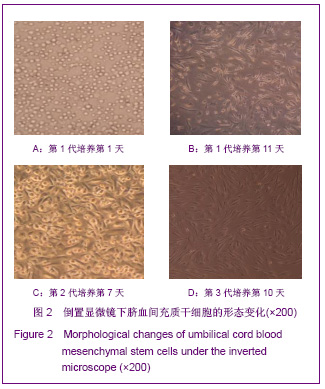
| [1] Strauer BE, Brehm M, Zeus T,et al. Repair of infarcted myocardium by autologous intracoronary mononuclear bone marrow cell transplantation in humans.Circulation. 2002; 106(15):1913-1918. [2] Wang C,Xu Y,Song WG,et al.Xibao yu Fenzi Mianyixue Zazhi. 2007;23(5):466-468. 王超,徐蕴,宋文刚,等.大鼠骨髓间充质干细胞分离培养方法的建立及其表型分析[J].细胞与分子免疫学杂志,2007,23(5) : 466-468.[3] Shah HR, Vaynblat M, Ramdev G,et al. Experimental cardiomyopathy as a model of chronic heart failure. J Invest Surg. 1997;10(6):387-396.[4] NAKAHATAT, Expansion of hematoPoietic Progenitors.In: Bajus JL,et al.eds,Education Program of the 26th Congress of The Intemational Society of Haematolog Singa Pore. 1996: 29-302.[5] Erices A, Conget P, Minguell JJ. Mesenchymal progenitor cells in human umbilical cord blood. Br J Haematol. 2000; 109(1):235-242.[6] Kim JW, Kim SY, Park SY,et al. Mesenchymal progenitor cells in the human umbilical cord. Ann Hematol. 2004;83(12): 733-738.[7] Goodwin HS, Bicknese AR, Chien SN, et al. Multilineage differentiation activity by cells isolated from umbilical cord blood: expression of bone, fat, and neural markers. Biol Blood Marrow Transplant. 2001;7(11):581-588.[8] Kern S, Eichler H, Stoeve J,et al. Comparative analysis of mesenchymal stem cells from bone marrow, umbilical cord blood, or adipose tissue.Stem Cells. 2006;24(5):1294-1301.[9] Chang YJ, Shih DT, Tseng CP,et al. Disparate mesenchyme-lineage tendencies in mesenchymal stem cells from human bone marrow and umbilical cord blood. Stem Cells. 2006;24(3):679-685.[10] Huang JL,Yang SX. Zhongguo Zuzhi Gongcheng Yanjiu yu Linchuang Kangfu. 2008;12(47):9367-9370. 黄景玲,杨水祥.人脐血源性间充质干细胞向心肌细胞的诱导分化[J].中国组织工程研究与临床康复,2008,12(47):9367-9370.[11] Leor J, Guetta E, Feinberg MS,et al. Human umbilical cord blood-derived CD133+ cells enhance function and repair of the infarcted myocardium. Stem Cells. 2006;24(3):772-780.[12] Henning RJ, Abu-Ali H, Balis JU, et al. Human umbilical cord blood mononuclear cells for the treatment of acute myocardial infarction. Cell Transplant. 2004;13(7-8):729-739.[13] Ma N, Ladilov Y, Moebius JM,et al. Intramyocardial delivery of human CD133+ cells in a SCID mouse cryoinjury model: Bone marrow vs. cord blood-derived cells.Cardiovasc Res. 2006;71(1):158-169.[14] Hu CH,Wu GF,Wang XQ,et al. Zhonghua Xinxueguanbing Zazhi. 2006;34(7):587-590. 胡承恒,伍贵富,王小庆,等.人脐血单个核细移植治疗大鼠急性心肌梗死的实验研究[J].中华心血管病杂志,2006,34(7):587-590.[15] Sadat S, Gehmert S, Song YH,et al. The cardioprotective effect of mesenchymal stem cells is mediated by IGF-I and VEGF.Biochem Biophys Res Commun. 2007;363(3):674-679.[16] Siepe M, Akhyari P, Lichtenberg A,et al. Stem cells used for cardiovascular tissue engineering. Eur J Cardiothorac Surg. 2008;34(2):242-247.[17] Tura BR, Martino HF, Gowdak LH,et al. Multicenter randomized trial of cell therapy in cardiopathies - MiHeart Study.Trials. 2007;8:2. [18] Soares MB, Lima RS, Rocha LL,et al. Transplanted bone marrow cells repair heart tissue and reduce myocarditis in chronic chagasic mice. Am J Pathol. 2004;164(2):441-447.[19] Schannwell CM. Stem cell therapy for cardiovascular diseases. Experiences in Düsseldorf. Dtsch Med Wochenschr. 2008;133 Suppl 8:S274-279.[20] Psaltis PJ, Zannettino AC, Worthley SG,et al. Concise review: mesenchymal stromal cells: potential for cardiovascular repair. Stem Cells. 2008;26(9):2201-2210.[21] Boilson BA, Gulati R. Stem cell therapy for the heart: a perspective.Transl Res. 2010;155(1):3-5.[22] Cranefield PF. Action potentials, afterpotentials, and arrhythmias. Circ Res. 1977;41(4):415-423.[23] Valiunas V, Doronin S, Valiuniene L,et al. Human mesenchymal stem cells make cardiac connexins and form functional gap junctions. J Physiol. 2004;555(Pt 3):617-626.[24] Leobon B, Garcin I, Menasche P,et al. Myoblasts transplanted into rat infarcted myocardium are functionally isolated from their host. Proc Natl Acad Sci U S A. 2003;100(13): 7808-7811. [25] Price MJ, Chou CC, Frantzen M,et al. Intravenous mesenchymal stem cell therapy early after reperfused acute myocardial infarction improves left ventricular function and alters electrophysiologic properties. Int J Cardiol. 2006; 111(2):231-239. |
| [1] | Jiang Tao, Ma Lei, Li Zhiqiang, Shou Xi, Duan Mingjun, Wu Shuo, Ma Chuang, Wei Qin. Platelet-derived growth factor BB induces bone marrow mesenchymal stem cells to differentiate into vascular endothelial cells [J]. Chinese Journal of Tissue Engineering Research, 2021, 25(25): 3937-3942. |
| [2] | Mo Jianling, He Shaoru, Feng Bowen, Jian Minqiao, Zhang Xiaohui, Liu Caisheng, Liang Yijing, Liu Yumei, Chen Liang, Zhou Haiyu, Liu Yanhui. Forming prevascularized cell sheets and the expression of angiogenesis-related factors [J]. Chinese Journal of Tissue Engineering Research, 2021, 25(22): 3479-3486. |
| [3] | Chen Lei, Zheng Rui, Jie Yongsheng, Qi Hui, Sun Lei, Shu Xiong. In vitro evaluation of adipose-derived stromal vascular fraction combined with osteochondral integrated scaffold [J]. Chinese Journal of Tissue Engineering Research, 2021, 25(22): 3487-3492. |
| [4] | Wei Qin, Zhang Xue, Ma Lei, Li Zhiqiang, Shou Xi, Duan Mingjun, Wu Shuo, Jia Qiyu, Ma Chuang. Platelet-derived growth factor-BB induces the differentiation of rat bone marrow mesenchymal stem cells into osteoblasts [J]. Chinese Journal of Tissue Engineering Research, 2021, 25(19): 2953-2957. |
| [5] | Chen Xiao, Guo Zhi, Chen Lina, Liu Xuanyong, Zhang Yihuizhi, Li Xumian, Wang Yueqiao, Wei Liya, Xie Jing, Lin Li. Factors affecting the mobilization and collection of autologous peripheral blood hematopoietic stem cells [J]. Chinese Journal of Tissue Engineering Research, 2021, 25(19): 2958-2962. |
| [6] | Guo Zhibin, Wu Chunfang, Liu Zihong, Zhang Yuying, Chi Bojing, Wang Bao, Ma Chao, Zhang Guobin, Tian Faming. Simvastatin stimulates osteogenic differentiation of bone marrow mesenchymal stem cells [J]. Chinese Journal of Tissue Engineering Research, 2021, 25(19): 2963-2968. |
| [7] | Li Congcong, Yao Nan, Huang Dane, Song Min, Peng Sha, Li Anan, Lu Chao, Liu Wengang. Identification and chondrogenic differentiation of human infrapatellar fat pad derived stem cells [J]. Chinese Journal of Tissue Engineering Research, 2021, 25(19): 2976-2981. |
| [8] | Gao Yuanhui, Xiang Yang, Cao Hui, Wang Shunlan, Zheng Linlin, He Haowei, Zhang Yingai, Zhang Shufang, Huang Denggao. Comparison of biological characteristics of adipose derived mesenchymal stem cells in Wuzhishan inbreed miniature pigs aged two different months [J]. Chinese Journal of Tissue Engineering Research, 2021, 25(19): 2988-2993. |
| [9] | Cao Yang, Zhang Junping, Peng Li, Ding Yi, Li Guanghui. Isolation and culture of rabbit aortic endothelial cells and biological characteristics [J]. Chinese Journal of Tissue Engineering Research, 2021, 25(19): 3000-3003. |
| [10] | Dai Min, Wang Shuai, Zhang Nini, Huang Guilin, Yu Limei, Hu Xiaohua, Yi Jie, Yao Li, Zhang Ligang. Biological characteristics of hypoxic preconditioned human amniotic mesenchymal stem cells [J]. Chinese Journal of Tissue Engineering Research, 2021, 25(19): 3004-3008. |
| [11] | Qin Yanchun, Rong Zhen, Jiang Ruiyuan, Fu Bin, Hong Xiaohua, Mo Chunmei. Chinese medicine compound preparation inhibits proliferation of CD133+ liver cancer stem cells and the expression of stemness transcription factors [J]. Chinese Journal of Tissue Engineering Research, 2021, 25(19): 3016-3023. |
| [12] | Dai Yaling, Chen Lewen, He Xiaojun, Lin Huawei, Jia Weiwei, Chen Lidian, Tao Jing, Liu Weilin. Construction of miR-146b overexpression lentiviral vector and the effect on the proliferation of hippocampal neural stem cells [J]. Chinese Journal of Tissue Engineering Research, 2021, 25(19): 3024-3030. |
| [13] | Chen Jie, Liao Chengcheng, Chen Zhiwei, Wang Yan. Bladder cancer stem cell markers and related signaling pathways: antibody targeted therapy [J]. Chinese Journal of Tissue Engineering Research, 2021, 25(19): 3090-3096. |
| [14] | Zhang Wei, Cui Shuaishuai, Zhou Zhichao, Hu Xiaohua, Yang Xiaohong. MicroRNA regulates histone deacetylase in the treatment of bone-related diseases [J]. Chinese Journal of Tissue Engineering Research, 2021, 25(17): 2767-2774. |
| [15] | Chen Liang, Meng Shu, Cheng Guoping, Ding Yi . Effects of fish scale collagen membrane on adhesion, proliferation and osteogenic differentiation of rat bone marrow mesenchymal stem cells [J]. Chinese Journal of Tissue Engineering Research, 2021, 25(16): 2494-2499. |
| Viewed | ||||||
|
Full text |
|
|||||
|
Abstract |
|
|||||
